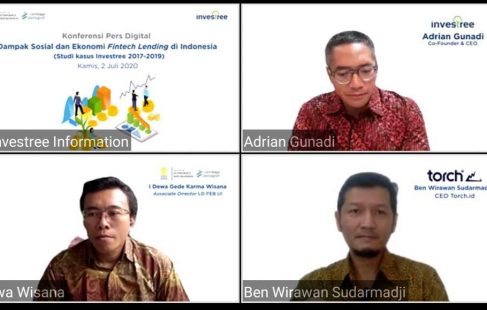FEB UI’s Demography Institute Disseminates Fintech Research Results
JAKARTA – Thursday (2/07/2020) The Demography Institute at the Faculty of Economics and Business, Universitas Indonesia (LD FEB UI), presented the results of research on peer to peer (P2P) fintech lending in Indonesia. The research found that the industry plays a big role in promoting financial inclusion in Indonesia.
The research, entitled The Social and Economic Impact of Fintech Lending in Indonesia (Investree Case Study 2017-2019), was the first study on the subject in Indonesia.
The research conducted by LD FEB UI found that fintech lending has helped increase financial inclusion among millennials, especially the 35 age group that makes up the largest part of Indonesia’s population. Fintech lending platforms disburse loans to various productive sectors in the economy, from agriculture to manufacturing and services.
LD FEB UI Deputy Head I Dewa Gede Karma Wisana said the research findings show the role of fintech lending in building an inclusive financial sector through digital platforms. The research, conducted in December 2019, was the first to use a case study to measure the social and economic impact of fintech lending in Indonesia. “Fintech lending’s growing contribution shows that technology can accelerate financial inclusion. This is evident from the fact that sectors that have limited access to credit such as the services and agriculture businesses can now participate in peer to peer digital lending,” said Gede Wisana.
LD FEB UI conducted face-to-face interviews with 261 borrowers selected randomly in Jabodetabek (77%), West Java (15%), Central and East Java (8%). In terms of types of loan, borrowers in the online seller financing category dominated the reseach (62%), followed by the invoice financing category (32%) and the working capital term loan category (6%).
The research also found that many borrowers are engaged in the creative industry. Of the total of Investree’s borrowers, 24% are creative industry players and 15% of them have reported revenue growth of between 30% and 50% after they obtained a loan. A total of 52% of creative industry players who borrowed money from Investree used the invoice financing scheme, 33% used the online seller financing scheme, and 15% used the working capital term scheme.
Dewa Wisana added that the creative industry is indeed becoming a prima donna, especially among the millennial generation. There are 16 sub-sectors of the creative industry, such as consulting or advertising, visual communication design and architecture, that are growing rapidly, thus a high demand for loan from these sectors.
The creative industry is not the only industry to have enjoyed revenue growth after receiving loans from fintech lenders. Investree data show that 58% of Investree’s borrowers engaged in the manufacturing industry posted a revenue growth of 20% to 50%; 52% of Investree’s borrowers from the services sector and 51% of from the construction sector also reported revenue growth.
Overall, 56% of Investree’s borrowers reported revenue growth after they obtained a loan from Investree. Apart from providing capital for Indonesia’s micro, small and medium enterprises (MSMEs), Investree also supports the development of Indonesia’s syariah economy through syariah financing products.
Investree data show that syariah borrowers account for 21.6% of the total number of borrowers. The research found that 54% of Investree’s syariah borrowers reported business growth as indicated by their revenue growth. 20% of Investree’s syariah borrowers reported a 30% business growth and 34% experienced a 20% business growth.
The research also found that fintech lending helps increase job opportunities through labor absorption in the sector. LD FEB UI’s findings showed a 44% increase in the number of workers or the absorption of new workers employed by Investree’s borrowers.
Investree CEO and Founder Adrian Gunadi said that amid the Covid-19 pandemic, Investree continues to mitigate risks for business players who suffer from sluggish business. To that end, Investree combines traditional and non-traditional data such as data originating from payment gateways and online sales data.
“Through collaboration with e-commerce partners and payment gateways, we calibrate the risk profile. If the business has been good, we may lower the limit in several aspects,” said Adrian.
According to Adrian, digital footprint is one of the main considerations for loan approval by fintech lending platforms. Therefore, collaboration with other digital economic ecosystems such as e-commerce and payment gateways is very important to mitigate risks in the fintech industry.
(lem)




